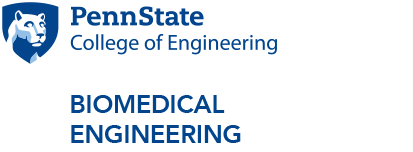Biomedical engineering department to host summer research programs for undergraduates
03/24/2016
The Department of Biomedical Engineering will host two summer research programs for undergraduate students in effort with The Department of Kinesiology and with support from the National Science Foundation and the American Heart Association. The programs will provide hands-on learning experiences for students in laboratory settings and teach a number of critical skills for new engineers.
The programs will run concurrently for ten-week cycles from May 30 to August 5, 2016.
The newest program, Penn State Cardiovascular Research: Engineering A Translational Experience (CREATE), is funded by a three-year grant from the National Science Foundation and will be offered for the first time this summer. Students will have an opportunity to join a number of cutting-edge research teams that focus on furthering the understanding of cardiovascular disease and developing medical interventions to treat related conditions. Research projects will emphasize the development of implantable devices, artificial gene therapy and drug delivery systems.
The CREATE program is unique in that it places a high value on student creativity as an attribute in research. Students who successfully complete the program will be taught a set of highly transferrable skills that can be used to foster creativity and invention in future academic pursuits. The goal is that the training will increase the number of new scientists with skills to detect, prevent and treat diseases through innovative techniques.
Undergraduate students at Penn State and students from outside institutions, particularly those enrolled in science and engineering programs and those with a strong interest in cardiovascular research, are encouraged to apply to the summer CREATE experience.
The second program, Penn State Summer Translational Cardiovascular Sciences Institute (STCSI), is administered jointly by the Department of Biomedical Engineering and the Department of Kinesiology at Penn State with support from the American Heart Association.
The STCSI experience is available to current Penn State undergraduate students and students currently enrolled at Pennsylvania colleges and universities who have completed 60-90 credit hours, and who are interested in participating in cardiovascular research between two academic years of study. This opportunity allows students to achieve a deeper and more continuous research experience.
Students accepted to the STCSI program will receive a $4,000 stipend to study cardiovascular disease at University Park, with particular focus on the cellular mechanisms of cardiovascular disease pathology and the determinants of cardiovascular disease risk across the lifespan.
Both programs will be administered under the guidance of Keefe Manning, PI and associate professor of biomedical engineering and surgery, with special support on the STCSI program from James A. Pawelczyk, associate professor of physiology and kinesiology.
The deadline to apply for both programs is April 11, 2016.
For questions or additional information, please contact Jenna Sieber, records specialist in the Department of Biomedical Engineering.



